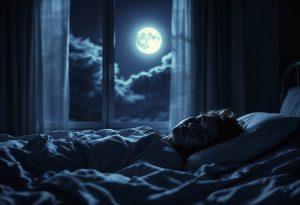Can the Full Moon Mess With Your Sleep Cycle? Know How
June 2, 2025 | Written by SleepyCat Team

As children, many of us were fascinated by urban legends about werewolves transforming under the full moon, or witches channeling the moon’s energy for eternal youth. These legends were not just some made-up material for children’s bedtime stories–they echoed centuries of belief in the moon’s ability to stir the human soul. In fact, the term lunacy stems from luna, the Latin word for moon. According to a study published on PubMed, 81% of mental health professionals (source) believe that the full moon can actually make you ill. But here is where it gets even more interesting: emerging research (source) suggests that the moon’s influence can actually affect our sleep cycle. Let us dig deeper into cosmic sleep hygiene.
The Lunar Effect-Myth or Fact?
For centuries, lunar phases have been linked with behavioral shifts, recent research is tying lunar cycles to find tangible physiological impacts-particularly on circadian rhythms.
A study published in Current Biology (source) found that around the time of a full moon, participants took longer to fall asleep, had shorter total sleep time, and experienced a 30% reduction in deep sleep. Adding on to the moon-sleep connection, a study from the University of Basel in Switzerland revealed that participants experienced reduced sleep duration even in the complete absence of moonlight. Researchers monitored brain activity, eye movements, and hormonal fluctuations, including melatonin levels, while participants slept in a controlled environment. The study concluded that humans, much like other organisms, exhibit a “circalunar” rhythm–a biological response to the moon’s cycle. Once thought to influence only marine animals and certain wildlife, the lunar pull seems to extend even to human physiology.
Also read – 101 Guide: How to Sleep Well
The Science of the Moon and Your Sleep
According to a study (source) published in 2021, it talked about the synchronization of human sleep to the lunar cycle. Sleep is governed by circadian rhythms–24-hour cycles that are highly responsive to light. Before the existence of artificial lighting, the light from the moon was sufficient to stimulate nighttime activities. The study interestingly found that individuals slept less on nights before the full-moon.
Light Sensitivity: The full moon is about 250 times brighter than a new moon. Even if you have got blackout curtains, subtle changes in ambient light could affect melatonin production, the hormone responsible for sleep onset.
Gravitational Pull: There is research (source) that proves that the moon’s gravitational pull has an impact on human physiology. It is hypothesized that lunar cycles can subtly impact fluid balance or pressure in the body-nudging our internal equilibrium.
Geomagnetic Impact: Research indicates that geomagnetic activity tends to decrease by approximately 4% in the seven days leading up to a full moon and rises by a similar margin in the week following. These subtle shifts in Earth’s magnetic field have been linked to changes in cardiovascular function (source) and melatonin production–the hormone that regulates your sleep-wake cycle. Elevated geomagnetic activity can cause physiological, neurological, and cardiovascular impact. This has been tied to humans developing circalunar rhythm over a period of time. According to another retrospective study (source) the participants slept an average of 25 minutes less during full moons.
Modern Factors Amplifying the Impact
The effect of the full moon on sleep may be amplified in urban dwellers, who are already dealing with screen time, inconsistent sleep routines, and higher stress. When your body is already struggling to regulate rest, the added lunar disruption can tip the balance further.
Studies prove that women may be more sensitive (source) to lunar shifts due to hormonal cycles that can overlap with the moon’s 29.5-day orbit. Some women get significantly less REM sleep when the full-moon is close.
How to Sleep Better During a Full Moon
If you find yourself tossing and turning during a cosmic intervention, you can resort to these few steps:
- Go Dim Early: Reduce exposure to artificial light at least an hour before bed. That includes phones, tablets, and TV screens.
- Blackout Your Room: Invest in blackout curtains or an eye mask to minimize external light cues.
- Ground Yourself: Gentle bedtime rituals–meditation, journaling, herbal teas–can help regulate nervous system activity and override lunar-induced restlessness.
- Get Some Sunlight: A 15-20 minutes early morning walk after waking up each day will help in regulating your circadian rhythm.
Featured Products
Cloud Pillow
Get the luxury and comfort of a hotel pillow at home. This is supersoft, lighweight and has a smart zipper for adjusting its firmness.
200 TC Percale Fitted Bedsheet Set
Make your bed within minutes, thanks to elastic corners which make it super easy to tuck perfectly!
300 TC Sateen Pillow Cases
Combining the buttery smoothness of sateen fabric with a refined, seamless design, these pillow covers offer a luxurious look free from visible zippers or buttons.
Jersey Fitted Sheets
Get the softest feel with its knit fabric that doesn’t wrinkle & stays snug with it’s elastic edges
